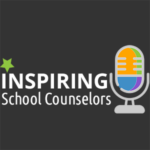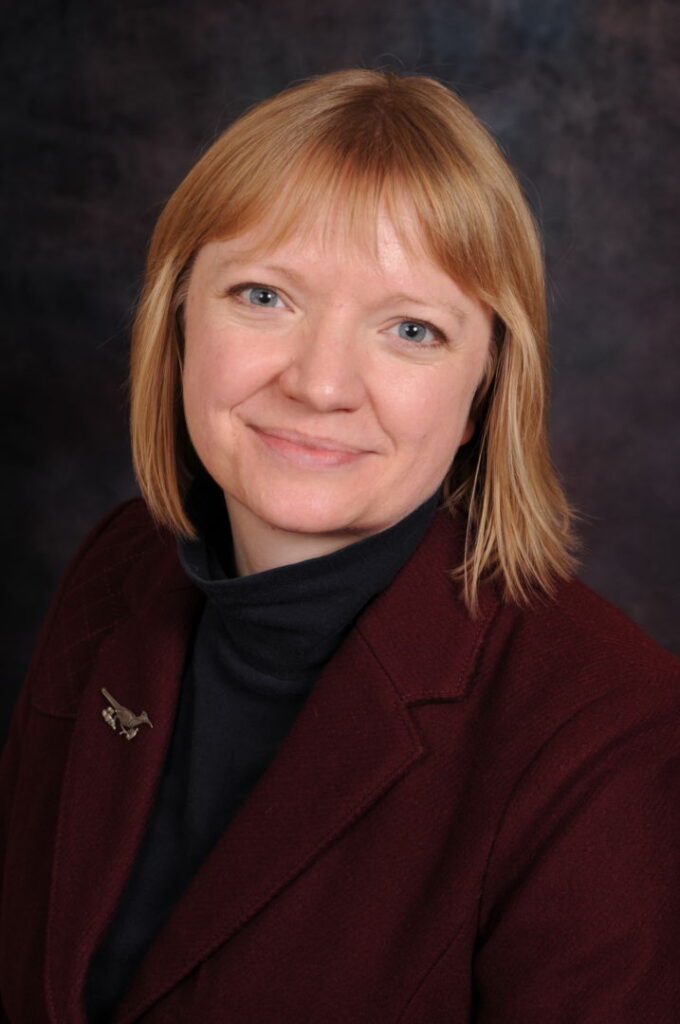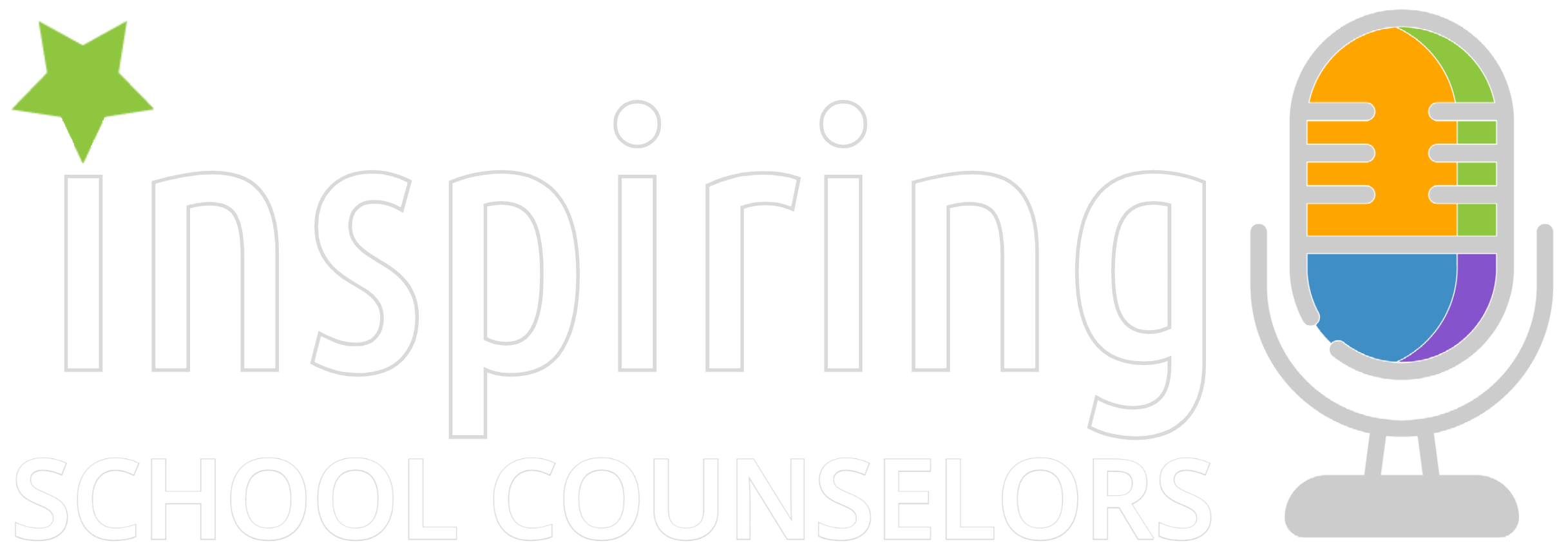Guest School Counselor Marianne Matt describes why her high school students love the Accuplacer (yes, really), a favorite time-saving trick, and her rediscovered habit of journaling.

This Week's Storyteller
Marianne Matt resides with her family in Madison, Wisconsin where she is THE high school counselor at Capital High. Marianne was named a National School Counselor of the Year finalist in 2022 by ASCA (American School Counselor Association). In her free time she enjoys gardening, camping, and generally getting outside into nature.

Share YOUR Story!
 Do you have a touching or funny (or both) story about school counseling? We want to hear it! Drop us a line or record your story with our online Sound Booth.
Do you have a touching or funny (or both) story about school counseling? We want to hear it! Drop us a line or record your story with our online Sound Booth.
If you have questions or need help, let us know!
Subscribe
Encouraging Words for School Counselors is also available on these podcast apps and others. If you can’t find the podcast on your favorite app, let us know and we’ll make sure we get there. If you prefer to listen in your browser, visit https://inspiresuccess.org/podcast every week for a new episode. For new episode notifications and more, follow Inspire Success on Facebook, Instagram, or Twitter.
Transcript
A rough transcript follows.
Matt Fleck:
Welcome everyone to a new season of our podcast, newly renamed Inspiring School Counselors. The new Inspiring School Counselors podcast still features stories from school counselors about school counseling, but our focus has shifted to highlighting the resources, best time-saving practices, new habits, and fresh ideas that school counselors from around the country are using in order to be the best school counselors they can be. That is what Inspiring School Counselors is all about. Our own Aimee Portteus will conduct the interviews and then we whittle them down to a podcast that gives you just everything you need to know. In the shortest amount of time, we are excited about this new format. We hope you are too. And in a few minutes, we’ll share how you can be on the podcast. But first let’s join Aimee as she talks with our guest school counselor, Maryanne Matt.
Marianne Matt:
I am a high school counselor in Madison, Wisconsin. I’m at a choice high school. It’s a public school. 20 years ago you might have called it an alternative high school, but I really prefer to use choice because it’s a choice for kids to come. They can choose to stay or go. And the stigma that comes with the word alternative is not the same, but yeah, I’ve been to school counselors since my eighth year. Um, prior to that, I was a classroom teacher. And, um, you know, before that I was in retail and I was in collections and all sorts of things before I came to education. But I, I found, I, I don’t wanna quite say my calling, but education is where I need to be. And school counseling is my niche.
Aimee Portteus:
That’s interesting. So that was a journey to where you are.
Marianne:
Yes, it was.
Aimee:
You spoke specifically about taking your kiddos to take the Accuplacer. Tell me a little bit about that. That sounds like it was a cool experience.
Marianne:
Yeah, well, we’ve been actually doing it for a number of years, even, um, as when I was a teacher, but as a counselor, I really partnered with our local technical college. So that way, and I won’t take full credit. Right. Because our principal had to be involved too to get dual credit classes in, but we, our seniors take dual credit classes. So we take them to the community college to take the Accuplacer, which is kind of the entrance exam for those classes. When students can see where their skills lie on those tests. And then in relation with the dual credit classes that they’re taking and they understand that they could potentially override their test score by showing their skill in a classroom setting. And you know, so, uh, the dual credit classes we have are basically kind of in line for that next step up.
So the dual credit would boost you into an English one class, which is, you know, that transferable college class that most, most high school or high school college freshmen take. So our, our love, our English and reading class reading, sorry, reading and writing class that we offer gets those skills right up there. So even if they’re an English language learner or if they’re just not a great test taker, they can bypass those test scores or maybe their test scores will show that they’ve already met competence and we can move them into different avenues that are more personalized their education. Yeah. <laugh> that experience for the kids is just amazing because it is it’s those aha moments that start hitting and they’re on that college campus. So they start seeing themselves as the adults, as the academics that they could be. And they see people that they know, they see people who have graduated before them who look like them and are going for going for their goals at this college. And it’s, you know, they can transfer out and go to a four year college from here as well. So
Aimee:
Yeah, there is power power to them stepping on campuses. That’s that’s cool that you do that purposefully. Yeah. Yeah. I don’t. They just see themselves in different light when they, when they get to do that.
Marianne:
Yep. And you give them freedom, you know, like we, we because they’re seniors, we trust them, you know, go, go explore the campus. You’re not gonna get in trouble. Well, we’d like to think that, but you know, for the most part, they’re not, they’re really curious and they wanna know what it, like, try it on, feel it out.
Aimee:
Yeah. That’s really cool. You also spoke about a resource that you had that you thought was a good time saver and that was a newsletter.
Marianne:
Yeah, I know. It seems so simple, but it really is such a time saver and it’s something I’ve built a capacity over the years because you know, school counselors, we get so much in our inbox, so many good resources, so much that you wanna share. So I have a small account and I just, I, I continually update it, you know, as I something pops in and I take things out as they, you know, are no longer good, but that way my students and my families and the staff know that they can always go there and there’s always gonna be something, whether it’s a job opportunity, um, an opportunity for a scholarship, an opportunity to do a virtual, um, college fair, whatever it is. There’s, you know, just so much opportunity.
Aimee:
Yeah. There’s a lot of things for them to do there. Can you tell me, do you have a staff or is it just you in this school?
Marianne:
Yeah, it’s just me. <laugh>, our registrar, our administrative assistant is the same person and he is my right hand, man, for sure. Um, he helps with all my data and he helps with ensuring that I, I have beautiful pamphlets and things like that, because he’s just really good at that. But yeah. Nope. It’s just me.
Aimee:
That’s I that’s, that’s very interesting. That’s, that’s great that you can do all those things when it’s just you. I appreciate that.
Marianne:
Well, well and I think though, that’s, that’s like the newsletter, you build a capacity because that’s something that I always wanna tell people. I didn’t start doing this day one. I didn’t have all of my ducks in a row. You know, you, you build one thing at a time and then you can slowly do it all well or almost all
Aimee:
We want to do it all.
Marianne:
Right. Right, exactly.
Aimee:
Now you also mentioned a particular book that you liked that was called Interrupting Racism. Tell me a little bit about how you use that or how that’s impacted your work or your students.
Marianne:
Yeah, I was really lucky. The Madison school district counselors did a book study last year with it. So we really dug in deep. Um, but I found it just so, so impactful for me because it’s one of those resources that not only talks about the theory and talks about our ethical guidelines as counselors and what we need to be doing to ensure that all students are getting equitable education and access to opportunities, but it also gives practical tips. You know, I love when they offer lesson ideas at the elementary, middle and high school level, because even if it’s not something that you’re gonna do, you can take those ideas and kind of springboard from that. And you have that model to work from as well. You know, as someone who was a classroom teacher, I know how to write lessons. I know how to manage a classroom and things like that, but I know not all counselors know how to do that. And that’s why this resource I thought was just so good and it’s so appropriate for the time that we’re living in and, and what our students need. All students should have access to opportunities no matter where they’re going to school and it’s our, it’s our responsibility as the counselors to ensure that. And that’s, that’s why this book is just, it really just digs in and gives you practical tips to make that happen.
Aimee:
I don’t mean to put you on the spot, but can you give an example of a practical tip?
Marianne:
Yeah. Um, it is, it’s actually talking to your – at the high school level – talking to your students about the efforts that you go through to make sure that they can access opportunity. That sounds silly, but it’s really kind of opening their eyes that not everything is just, it just doesn’t just happen. Um, and that’s an anti resource strategy. Like letting students know that there is behind the scenes work that goes on. So that way they can access the things that they’re accessing. It’s, it’s kind of, ah, it kind of the wizard of eyes, you know, kind of unveiling the man behind the, the, the machine, you know, what goes on back there because if they can understand the inner workings of the different, um, the different institutions that they’re gonna have to navigate or the different paperwork that they have to fill out, then it’s not as much of an enigma and they can understand no matter what, they’re up against that, how to navigate within those systems. So I hope that it’s kind of roundabout, but that’s really, that’s letting them know what you do.
Aimee:
I like that, that, that does make sense. And sometimes they don’t understand that. They think they’re out there struggling on their own. And so that’s great. The other thing that I pulled out, you just now started a journaling habit that you like.
Marianne:
Yeah. You know, I was an active journaler all as a teenager and then into my twenties a little bit, but I really kind of lost it. Um, but during the pandemic, I, you know, I had a little extra time on my hands when we were closed. It wasn’t traveling to work every day, um, just zooming in, but it, I really realized that in order to bolster my mental health and in order to also improve my professional practice, I needed to be able to reflect on what I have been doing. So whether, you know, personally, whether it’s just, you know, going through the day, like how to, how I felt, but really professionally it’s really reflecting on, you know, what did I do today? What could I have improved on? What can I do tomorrow that would, you know, help the situation if there was some kind of situation that I’d come up during that day.
But really then also, where am I gonna go? Because I feel like as a human I’ve taken the opportunities that have come to me, but as I get older, I do need to plan out a little bit more what I need, what steps I need to take to ensure that not necessarily my career, but that my life is going the way that I would like it to. And that I’m contributing to the community the way that I want to, um, whether it’s through my job or through volunteer efforts or whatever it is. Yeah. That reflection is so important. And it allows me to be grateful, which is also, you know, just a huge part of being able to, you know, remain positive for my students and in such a hard school year as well.
Aimee:
Tell me, uh, about your actual practice. Like, do you have a place that you journaled, do you have a particular book that you use? Does it have to be quiet? Do you play music? What what’s journaling look like to you?
Marianne:
That’s a great question. I didn’t even think about that, but I do. I have a little place in my house. We have a front window that’s a really big, nice window that looks out into our neighborhood and I have a chair there and that’s where I keep my journal. And it is a special journal that I found. It’s just a beautiful notebook, you know, that I found at a bookstore that just spoke to me and I’m like, yep, that’s it. And that’s usually how I pick ’em up too, because I really like paper products <laugh> but this one spoke and it, you know, it’s a really nice little journal and I just keep it right there so I can access it. I will say I have to be better in my practice because it’s not necessarily every day, because some days are just very busy. Um, but I do try to do it in the mornings before I leave. So that way I kind of put my head on straight, but then I also try to do it at night. So that way I can reflect on the day, um, that I’ve had. So yep. <laugh>
Aimee:
What a great practice that’s probably more beneficial to you, your health than you realize.
Marianne:
Yep. It’s true. And just even speaking with you, I’m like, yeah it is. And I have a habit. That’s a good thing.
Aimee:
<laugh> that’s a good one. Every was really nice to meet you.
Marianne:
Thank you so much, Aimee. This is a wonderful way to start my Monday morning. So thank you.
Aimee:
Great. Well you have a good week. We’ll talk to you soon.
Marianne:
You, too. Okay. Byebye.
Aimee:
Bye.
Matt:
That’s Marianne Matt, school counselor at Capital High School in Madison, Wisconsin speaking with our own Aimee Portteus.
If you would like to participate in our podcast, just go to inspire success.org/podcast and click on the link to the Inspiring School Counselor form, which will ask you just a few simple questions and only takes a few minutes to complete. Hey, thanks everyone for listening. I’m Matt Fleck and we hope you’ll join us again next time.
